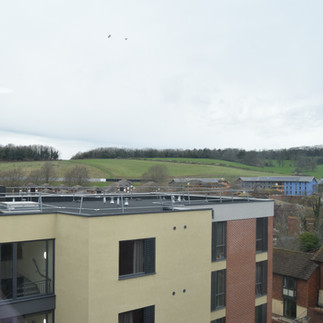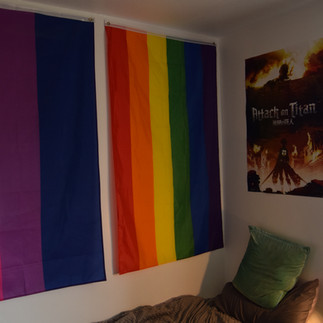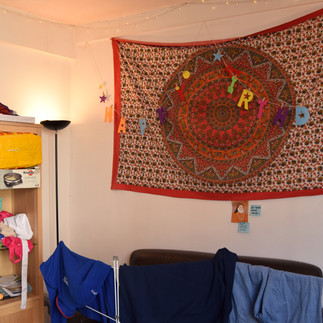Student housing: good, bad & ugly
- Anke Schwittay

- Jul 7, 2023
- 9 min read
When I started interviewing co-founders and residents of student housing coops in the UK, what struck me was that for many of them their committment to housing coops had come from their own negative experiences with regular student housing. Some of them had had horrendous experiences that affected their abilities to study as well as mental and physical health, while others had just become tired of being exploited by greedy landlords, including in some cases their own universities. This made me realize that I needed to learn more about conventional student housing. To document my research, I teamed up with photographer Tammi Nowell and in the spring of 2023 we undertook research with 15 Sussex students, ranging from first years to international MA students to PhD researchers, living either on campus or in Brighton. Here I want to share some of the images and stories we captured. Participants also had the option of writing a short piece to accompany their photos, and some of them did. All participants approved the final photos shown here.
Campus home away from home?
The photos in this section show accommodations in the nicest and most expensive halls on Sussex campus: the new East Slope residences which were built between 2016 and 2019, as well as Northfield. Rents here are around £176/week for a room with a small en-suite bathroom, with all bills included. The students who can afford to live here are generally happy.
Northfield also contains a block of family housing, which is relatively affordable at £1028/month for a small two-bedroom flat. There are not enough family accommodations on campus, however, which results in long waiting lists.
Campus Construction Chaos
Living on campus was a very different story for two students who lived in older accomodations, which were generally cheaper (between £125 - 150/week) with shared bathrooms. More importantly however, they were severly affected by the construction of the new West Slope development that is currently happening in the heart of campus, creating severe noise and light pollution as well as other disruptions. Similar to what happened with the East Slope development a few years ago, older inexpensive housing, this time in Park Village, is being torn down to make room for 1900 new student beds, a new study and health centre as well as commercial spaces. While the Park Village buildings were not up to code any more, their removal takes away some of the most affordable on-campus housing options. In a time-honed Sussex fashion, students have mobilized against this through two campaigns: Squat the Slope occupied the former Park Village social centre in the autumn in 2022 until the students were forced to leave by a court order, and the Lewes Court Campaign ran this spring to successful demand rent reductions for students affected by the construction.
Here is what one student living in one of these halls, who also participated in the Lewes Court campaign, wrote:
I have had a very mixed experience with my housing experience at the University of Sussex throughout my first year living in halls. When I first moved in, I believed I had hit the jackpot of university accommodation – beautiful view, newly renovated house, close route to the centre of campus. However, this only lasted a couple of weeks due to the development of a new accommodation beginning in the second week of the semester which cut down the view of the trees and blocked off any accessible route to campus. I was notified before I moved in that my accommodation would be minorly affected by these works (infrequent water shortages, occasional wifi interruptions), but as soon as the construction started it was clear that we were grossly misled into believing the disruptions would be inconsiderable. From constant noise from the works and floodlights that shone all night long through my bedroom window to murky, undrinkable water and ‘necessary’ works past midnight, I had countless sleepless nights while settling in and adjusting to being away from home for the first time and preparing for assessments.
I was also disheartened by the issues which arose in my newly renovated house. Yes, the new furniture and fresh coat of paint were lovely, but I wasn’t able to enjoy the perks when we didn’t have all the amenities expected from a halls of residence. When I moved in we were missing: shelves, lights above the mirrors, hangar poles, pinboards in the bedrooms and kitchen and sofas. Most of these issues were resolved, but none to the standard you would expect. The hangar poles were placed so that clothes hung lower than the shelf below, the pinboards were placed the wrong way around, we only got a sofa in April (!) and the shelves and mirror lights still had not arrived by the time I moved out. What’s more, due to the new brands of appliances, so many things broke multiple times. It once took two weeks for our hob to be fixed, and our oven was broken upon arrival. To have maintenance men in and out of your house every other week is very invasive. All in all, I enjoyed my first year enough to be able to overlook the issues I faced in my accommodation, but I do often wonder what I’m paying for, and the sleepless nights and constant exhaustion definitely ruined my experience of living on campus.
International Student Housing Lottery
International students have particular challenges when it comes to finding housing. At Sussex, all international MA students have guaranteed housing, for themselves only, if they complete a housing application by August 1st and pay their tuition fee pre-payment or provide scholarship or sponsorship evidence. We visited two students who lived in university housing, the first one in a large shared house in a residential neighborhood in Hove, very close to the seafront. Here is his story, along with first three photos below:
It wasn’t the best of starts; especially with the steep trek leading up to my house and the incessant rain but it didn’t take long for Brighton to become home. While having the beach within a five minute saunter helped, sharing the house with seven other students frequently did the opposite. We are all from different countries and cultures with diverse food habits and etiquettes, so I didn’t expect it to be smooth either way. Despite our differences though, we learnt to find warmth in each other’s company and when not, the radiators provided ample for us thankfully because the electricity bills were part of the (exorbitantly high) fixed rent and we didn’t have to pay extra. That was one of the many reasons I chose to stay in a university-managed accommodation. Having dealt with dubious landlords in the past, I didn’t want to take that risk in an unknown country with limited support networks and a faint understanding of the laws, especially when the balance of power is already heavily skewed in favour of the landlords. The University didn’t ask me for a guarantor or a high deposit up front, which are some of the common practices if one takes the route of renting a place on their own. Most importantly, even with the rising cost of living, I didn’t have to pay extra for my electricity bills as they were a part of my rent, which I doubt would’ve happened otherwise. While the rent is high and there have been occasional hiccups, the University Housing has been proactive in addressing any issues we’ve had in the house. It has taken its time but Brighton is now home, and it’s difficult to imagine living anywhere else after this.
The bottom row of pictures are from the second student, who lived on campus in a complex that sits between a busy A-road and a trainline. He reflected that:
I live in Stanmer Court, as every accommodation it has pros and cons. It’s easy to travel from here as the bus and railway station are next to it. But it’s very noisy, I can hear vehicles’ sound all the time and it’s very annoying sometimes in the nighttime. Also, it’s exhausting to walk all the way on a busy day after the sessions. Lastly, the rooms are slightly older - it has broken carpets and I can see silverfishes sometimes.
However, if international students miss the August deadline, because of visa or other delays, they have to find a place to stay in the private housing market. There, they either need a guarantor or have to pay at least six months rent upfront, which can be prohibitively expensive. That is if they are lucky enough to finding something in Brighton when they arrive in September. Often students end up living in London or even further away, staying with family or friends or even new classmates in the first few weeks or months. This has happened to the third student we talked to, who had moved around repeatedly and even though he had found a flat for himself and his family, he was still dealing with construction work and an unresponsive landlord.
My experience with housing in the UK has been a varied and challenging one. I took some time to settle in a fixed location wanting to be able to accommodate my family easily when it was their time to join me. There are a few things that I would do differently given the chance but I’m not sure if I would’ve changed this approach. I console myself with the fact that I was able to experience different slices of life in the UK, from Angmering to Eastbourne and points in between.
Student Living in the City
The last set of photos are from three different private rentals in Brighton. Two of them are in the Lewes Road neighborhood, just off the official ‘university corridor’ that connects Brighton to the university campuses in Moulsecoombe and Falmer. In the first house we visited, three students talked about a ‘culture of neglect’ that made them feel like a nuisance for their legitimate complaints, or being infantilized when their concerns are not seen as valid. They described how many students become desensitized to their horrible living conditions, which are normalized among greedy landlords and unresponsive agents. Going home for Christmas often exacerbates the problems when students return to cold houses where mould has bloomed in their absence. When landlords demand that students run the dehumidifiers they supply, leave the windows open and have the heating on full, this just feels like a slap in the face when bills are not included in the rent.The physical and mental health strains this created was palpable while we shared a cup of tea with the students in their dark and cramped kitchen.
Here is how one of students described her living experience:
This is not my term-time address, this is the only place I can really call home. We’ve done well to create a warm space where we can cook and laugh together, but it’s tainted with the repeated disregard of our living conditions by our landlord and agency. We’re treated like a nuisance for the list of necessary repairs we have presented, many of which remaining unfulfilled. So many emails ignored; the threat of legal action seems like the only thing that animates them. We’ve received visits with no prior warning and been aggressively challenged when we refused to let two unidentifiable men into our home.
Black mould is blamed on our reluctance to keep heating on and windows open - during an energy crisis. We had to pay out-of-pocket to replace a frosted window that made my housemate’s bedroom (!) as dark as dusk. This same room contained our old and raucous boiler, which forced us to choose between warm water in the dead of winter or her ability to sleep. The spaces are poky with poor natural lighting throughout, and very clearly designed for maximum efficiency. It feels as though ‘student housing’ is synonymous with ‘battery farming’, for those of us on a tighter budget. This bare minimum approach to the quality and liveability of accommodation in Brighton makes me question I want to stay here. This is not my term-time address. I’m exhausted from battling to call some place home.
The second house in the neighborhood was nicer but also much more expensive, which created a lot of financial stress for the student we spoke to. They told us that they had rented the house in a bit of a panic when they were just settling into living on campus early on in their first year, not fully considering the financial implications. This is repeated when prospective student tenants are coming around to view the houses, often unannounced and repeatedly. The last house was on leavy Ditchling Road, very far from uni and the student's place of work. While it was a nice, relatively affordable house, the international student who lived here often felt lonely because there was no shared space. In fact, she moved out a few weeks after we visited to live with friends.
While clearly not everybody’s student living experience is the same, there are different stresses for everybody we talked to. On the other hand, almost everybody also mentioned that it was really the people they lived with who made their accommodations a home.
The photos shown here are just a selection; the whole exhibit was first shown during the Student Housing Coop National Gathering at Sussex University in May 2023. We would like to thank all the students who participated in this project, opening their (temporary) homes to us and sharing their stories. We are currently exploring other places for showing the photos.









































































































This was a really helpful breakdown — as someone currently looking into Student accommodation in UK, it’s great to see both the positives and challenges laid out so clearly!